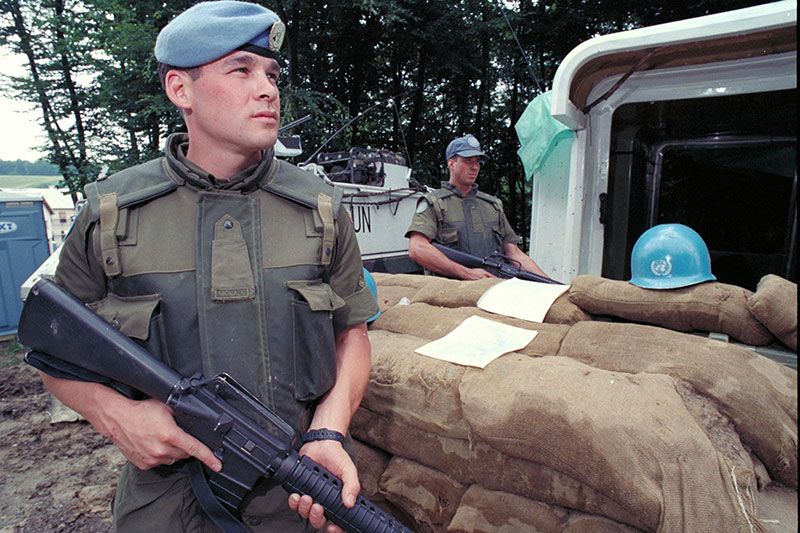
History
The Balkans are a large, mountainous area in southeast Europe. From 1929 to the early 1990s, the west-central part of the region comprised a single country: Yugoslavia. It had been created as a federation of several separate countries after the First World War.
Disagreements among the different states of the Federal Republic of Yugoslavia (FRY) led to its breakup. This began in June 1991, when Slovenia and Croatia declared independence. Other states followed, resulting in years of fighting marked by ethnic violence. Eventually, the FRY broke up into six independent countries (Bosnia and Herzegovina, Croatia, Montenegro, North Macedonia, Serbia and Slovenia) and one territory that is still disputed (Kosovo).
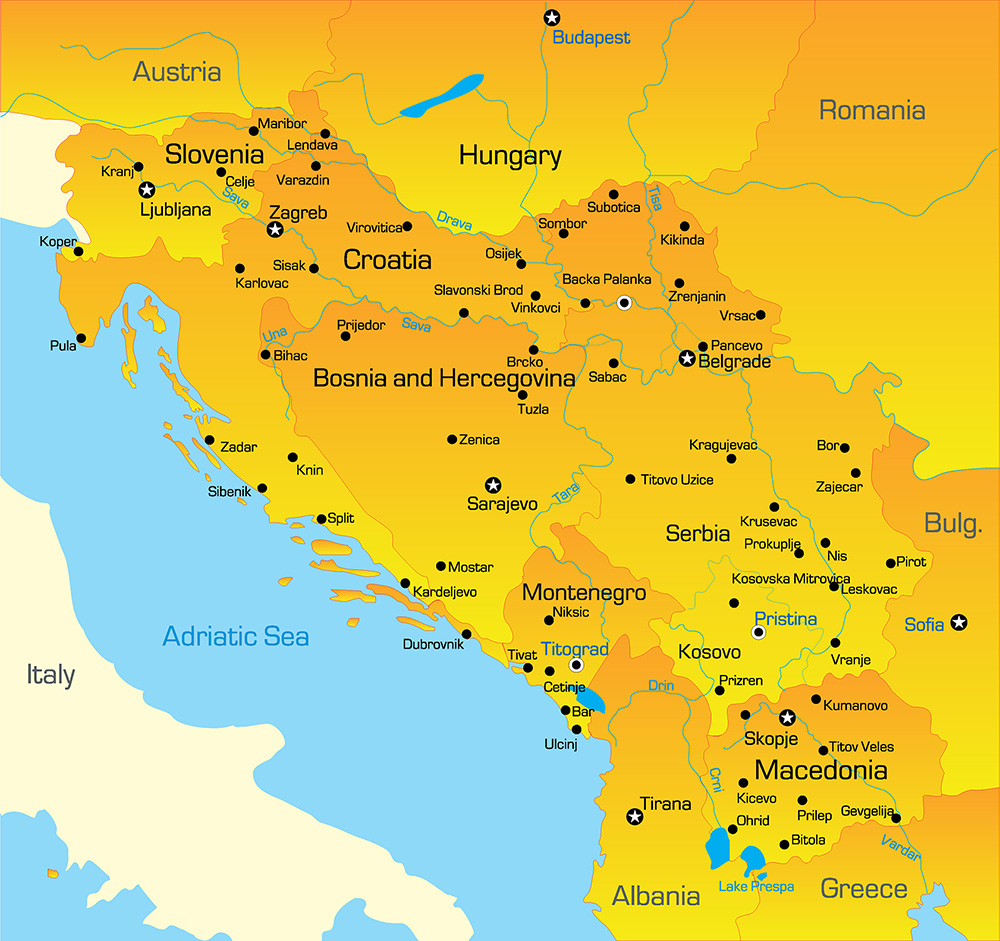
International Response
After the breakup of the Federal Republic of Yugoslavia, the United Nations (UN), North Atlantic Treaty Organization (NATO) and European Union (EU) became involved in peacekeeping efforts.
European Community Monitoring Mission
The European Community Monitoring Mission in the Former Yugoslavia (ECMMY) was established in 1991 to monitor the ceasefire agreement between Slovenia and the remaining Yugoslav Republic. Between 1991 and 1994, Canada contributed officers and support staff to this mission.
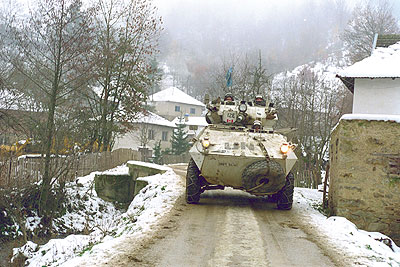
UN Protection Force (UNPROFOR)
The UN Protection Force (UNPROFOR) was established in February 1992 following the declaration of independence by Croatia and Slovenia. Its mandate was to ensure that the three UN Protected Areas (UNPAs) in Croatia were demilitarized and all persons residing in them were protected from fear of armed attack.
In April 1992, Canada provided an 860-person infantry battle group to UNPROFOR. In June 1992, UNPROFOR’s mandate and strength were expanded as the conflict intensified and spread into Bosnia and Herzegovina. UNPROFOR became responsible for the security and functioning of the Sarajevo airport and the delivery of humanitarian assistance to that city and throughout Bosnia and Herzegovina.
The Canadian battle group secured the Sarajevo airport on July 2 and held it for the next 30 days. Canadian Brigadier-General Lewis MacKenzie commanded UN forces in the city. In September 1992, UNPROFOR’s mandate was formally expanded into Bosnia and Herzegovina, and a second Canadian battalion of 800 was sent to the area.
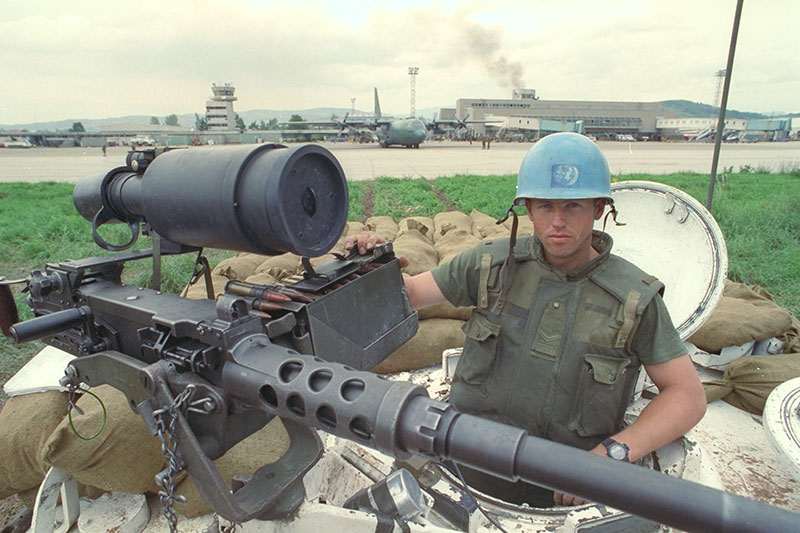
In March 1993, an 875-person CAF battle group arrived in Croatia, where it faced aggressive action from the Croatians. During the Battle of Medak Pocket on September 15 and 16, Canadian soldiers fought their most significant battle since the Korean War. Four Canadians were wounded, and as many as 27 Croatians were killed.
The CAF also contributed a regiment of engineers, 12 forward air controllers and a logistics battalion to UNPROFOR. Over three years, approximately 1,600 Canadians were serving in the Balkans at any one time.
On 31 March 1995, UNPROFOR was restructured to form three distinct peacekeeping operations: the UNPROFOR in Bosnia and Herzegovina, UN Confidence Restoration Operation (UNCRO) in Croatia and UN Preventive Deployment Force (UNPREDEP) in Macedonia.
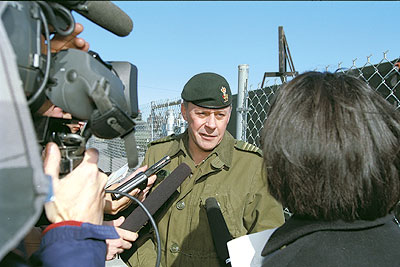
UN Confidence Restoration Operation (UNCRO)
In March 1995, a Canadian infantry battalion group began serving with UNCRO. However, Croatians felt that the UN presence was stopping them from reclaiming former Croatian territory from the Serbs. When they attacked and overran the Krajina region, they ordered UN forces to leave. By mid-October, all Canadians had been withdrawn from the area.
NATO Implementation Force (IFOR)
In December 1995, the presidents of Croatia, Serbia and Bosnia signed the Dayton Accords, which ended the war in Bosnia and laid out a framework for peace. According to this agreement, a large, heavily armed peacekeeping force would carry out the terms of the accords. NATO created the 60,000-strong Implementation Force (IFOR) and, in December 1995, launched Operation Joint Endeavour. This was the largest military operation undertaken by the organization to that date. Unlike previous peacekeeping missions, IFOR personnel could use deadly force.
The CAF contributed two six-month rotations of more than 1,000 troops. This included infantry, armour, engineers, medical personnel and military police. Their mandate included establishing freedom of movement in the area and supervising the withdrawal and separation of the previously warring factions.
Canadian warships also participated in Operation Sharp Guard, a NATO maritime blockade. In addition, Canadian pilots helped enforce the NATO “no-fly” zone during Operation Decisive Endeavour. IFOR’s mandate ended in December 1996.
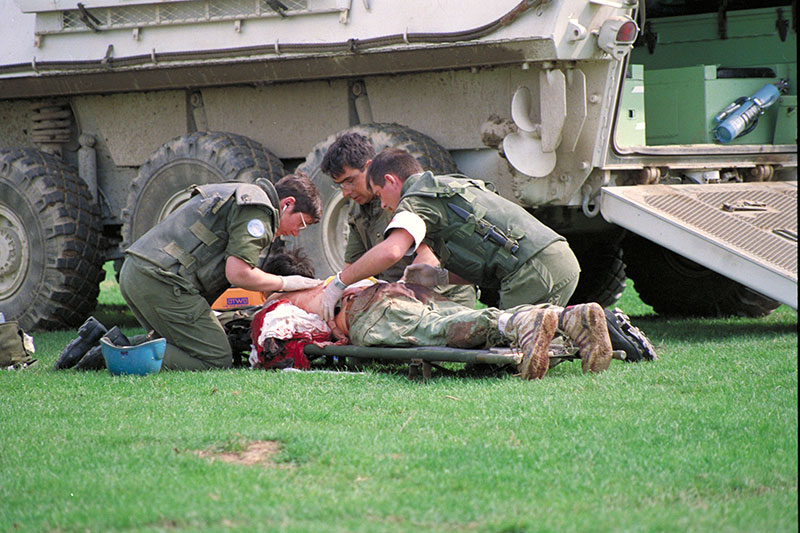
NATO Stabilization Force (SFOR)
IFOR was immediately replaced by the NATO Stabilization Force (SFOR) in December 1996. Its role was to create a secure environment for both local authorities and international agencies while Bosnia and Herzegovina became a democratic country. NATO provided about 12,000 troops, including approximately 1,200 Canadians. The CAF provided infantry, armour, engineers, helicopters and support elements on a six-month rotational basis.
As the security situation improved, NATO reduced the size of the mission. By April 2004, the CAF contingent was down to 650. When SFOR became an EU mission (EUFOR) at the end of 2004, Canada reduced its contribution to a Liaison and Observation Team of fewer than 85 personnel. By March 2007, the security situation had improved, and Canada had ended its involvement in EUFOR.
NATO Operation Determined Force and Allied Force
Under Operation Determined Force, aircraft from 12 NATO nations began enforcing a “no-fly” zone over Bosnia and Herzegovina in October 1998. Canada contributed six CF-188 Hornets. However, Yugoslavia ignored NATO’s warnings and continued to attack Kosovo.
As a result, on 23 March 1999, NATO launched Operation Allied Force. This was a 78-day bombing campaign to force Serbia to stop military action against Kosovo. Canada increased its contribution to 18 Hornets.
Kosovo Force (KFOR)
NATO created KFOR in March 1999 to establish and maintain security in Kosovo and assist the UN Mission in Kosovo (UNMIK). The first CAF units arrived in June 1999 and consisted of about 800 military personnel, including engineers and armoured personnel, and eight helicopters. In July, the CAF provided another 500 infantry soldiers, as well as tanks. Two troop rotations followed before Canada ended its unit contributions in June 2000. Today, it provides five staff officers to KFOR headquarters.
NATO Operation Essential Harvest
In the Former Yugoslav Republic of Macedonia (FYROM), the country was divided between its Slav (Macedonian) majority and ethnic Albanian minority. When the Albanians launched large-scale attacks against government forces in the summer of 2001, the FYROM asked NATO for help.
On 27 August 2001, NATO mounted Operation Essential Harvest with 4,500 troops. Its 30-day mandate was to collect weapons from ethnic Albanian paramilitary groups and monitor the situation after disarmament. The CAF contributed 200 personnel to the mission, which ended on 26 September.
Other Missions
The CAF contributed staff officers and other specialists to various missions in the Balkans. These included the UN Mission in Bosnia and Herzegovina (UNMIBH), UN Mission in Kosovo (UNMIK), NATO Task Force Headquarters for Operation Amber Fox, EU Peacekeeping Mission in the Former Yugoslav Republic of Macedonia (EUFOR), UN Preventive Deployment Force (UNPREDEP), EU Force in Bosnia and Herzegovina (EUFOR) and NATO Headquarters Sarajevo (NHQSa).
Civilian Police
The RCMP and more than 20 other Canadian police agencies participated in the UN Mission in Kosovo (UNMIK) from June 1999 to March 2004. Up to 92 police officers served with the mission each year to maintain law and order and help build a democratic police service in Kosovo.
Canada also provided police officers to the UN Mission in Bosnia and Herzegovina (UNMIBH) and its successor, the European Union Police Mission (EUPM), from 1996 to 2005. Their role was to help develop an effective civilian police force in Bosnia and Herzegovina.
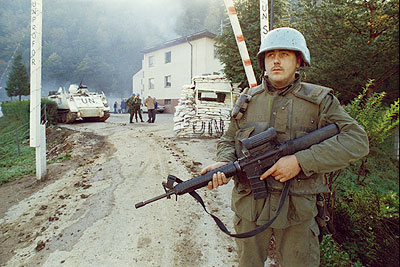
Significance
Canadian peacekeepers in the Balkans faced a difficult and dangerous task. The Balkan wars were marked by violence and ethnic cleansing. There was little “peace” to keep between warring ethnic groups. During the Battle of Medak Pocket, Canadians faced their most significant engagement since the Korean War. Peacekeepers also found and recorded evidence of atrocities and many were affected in the years following by post-traumatic stress disorder. The Balkans missions demonstrated the difficulties and costs, both financial and human, of modern peacekeeping.

 Share on Facebook
Share on Facebook Share on X
Share on X Share by Email
Share by Email Share on Google Classroom
Share on Google Classroom